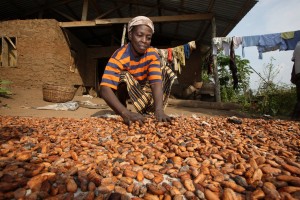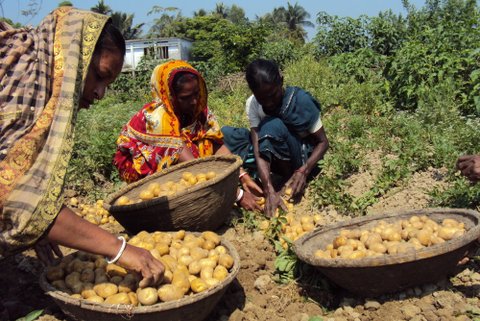发展项目, 乐施人乐施事2013年11月08日
In the face of global hunger, Hong Kong must stop wasting food

陈美玲
陳美玲於1993年加入樂施會,2005年離職。在職期間,曾專責香港樂施會中國項目部以及國際項目部的發展項目設計、策略及擴展等工作。2013年,美玲重返樂施會,目前爲國際項目總監。
By Mayling Chan – International Programme Director at Oxfam Hong Kong
In Hong Kong, like any modern city that tends to rely on globally sourced imported food, it’s hard to visualise the link between global issues of food insecurity and our own issues of food waste. The UN Food and Agriculture Organisation estimates consumer-based food waste in industrialised countries is almost as high as the total net food production of sub-Saharan Africa, that is, 230 million tonnes a year.
In fact, being able to control and reduce the volume of our food waste is a concrete way to contribute to global food security, which is characterised by the accessibility and availability of nutrition and food for all, through sustainable production, collection, distribution, marketing and equitable trade systems.
Having said that, modern cities have learned to be more self-sufficient in food provision over the past two decades. For example, farms have sprouted up in and around the city areas in Singapore, Havana, New York, Beijing, Caracas and elsewhere. Their purpose is to ensure greater adaptation to a world undergoing climatic changes that have affected production and crop yields.
Overconsumption of food seems to have become a daily habit for many. The people of Hong Kong produce more than 3,500 tonnes of food waste every day. On average we consume 1.12kg of food a day, yet in every three-person household, about 1kg of food will end up in a landfill.
It is encouraging to see that a handful of people in our city are trying to close the food waste loop. We consume locally produced food: local pork is sold in markets in Sha Tin and Tai Po, for example; farmed fish is enjoyed by tourists and locals alike; and locally grown vegetables are sold in agricultural markets that have sprung up in many districts, including commercial areas like Central and Taikoo Place.

Almost 900 million people on the planet go hungry everyday, revealing the severity of the global food problem.
This circular trend of local production and consumption supports the economy, which creates jobs. On top of this, it promotes a culture of resilience for our food and trade systems at all times, and a feeling of community, which celebrates the actions and culture to grow, rather than waste.
Few of us perhaps have a clear picture of how the people of Hong Kong can grow food, including raising small livestock. As of March 2012, there were 1,872 vegetable farms covering 415 hectares that were registered under a government scheme in Hong Kong. There are many more that have not registered that are scattered around on outlying islands, in food gardens and on the rooftops of many buildings across the city.
In Hong Kong, 4,600 people are directly involved in land-based agriculture and 11,000 in fisheries. The fact is that, due to a lack of support for a modern agricultural policy, overall production has fallen in the sector by some 24 per cent compared with a decade ago. This includes the raising of pigs, which has been marginalised; in 2011, the industry shrank to a fifth of what it was in 2001.
Researchers have recently looked at the potential for Hong Kong’s fisheries and livestock sectors to use feed processed from food waste, given that its production and distribution are subject to stringent health inspections and regulations. Take pigs as an example. It is estimated that there are 80,000 pigs being raised on Hong Kong farms. Every day, each pig consumes around 4kg of feed, or a total of 320 tonnes. By processing our food waste into pig feed, more than 2,100 tonnes could be put to good use, clearly demonstrating the market potential and value of food waste, pig feed and live pigs.
To encourage modest and sustainable consumption, Oxfam runs its Grow campaign all over the world. The purpose is to persuade policymakers to assist small farms and families by providing resources and helping them secure control over essentials like water and seeds to sustain a global network of food production.
Today, according to the International Fund for Agricultural Development, the world’s 500 million smallholder farms support around two billion people, almost one third of the total world population. However, many are among the world’s poorest people and, sadly, often go hungry. Thus, it is heartening to see that even impoverished countries like North Korea, where Oxfam Hong Kong works, has been able to grow more food in the past 10 years, closing its food gap by 60 per cent between 2002 and 2012, even with difficulties in obtaining sufficient fertilisers and fuel.
On annual World Food Day today, the UN estimates that 842 million people, around one in eight in the world, suffer from chronic hunger, regularly not getting enough food for an active life. We must see beyond our own desires, and consider our food waste and landfill sites in Hong Kong.
The actions of local people in collecting food waste on Lantau and Cheung Chau are encouraging. These initiatives have succeeded in reducing food waste gradually through education and by turning it into useful products to grow vegetables, and also creating jobs for women and retirees.
This local economy loop is happening in New York, Singapore and Tokyo; they are role models for Hong Kong to foster a more resilient and innovative society that grows food, rather than wastes it.

